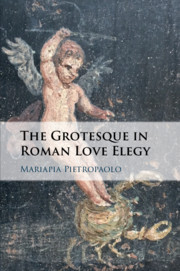Book contents
- The Grotesque in Roman Love Elegy
- The Grotesque in Roman Love Elegy
- Copyright page
- Dedication
- Contents
- Preface
- Acknowledgements
- Abbreviations
- Chapter 1 Premises and Expectations of the Elegiac Grotesque
- Chapter 2 Context and Prehistory of the Elegiac Grotesque
- Chapter 3 Cynthia and the Grotesque Ethos
- Chapter 4 The Ovidian Unmasking of the Elegiac Grotesque
- Chapter 5 Revolting and Refined: The Aesthetic Function of Acanthis
- Chapter 6 Grotesque Hermeneutics of the Lena in Tibullus and Ovid
- Chapter 7 The Rival: A Vir Foedus
- Chapter 8 Pasiphae and the Allurement of the Grotesque
- Chapter 9 Ovid’s Remedia and the Waning of the Elegiac Grotesque
- References
- Index
Chapter 7 - The Rival: A Vir Foedus
Published online by Cambridge University Press: 10 September 2020
- The Grotesque in Roman Love Elegy
- The Grotesque in Roman Love Elegy
- Copyright page
- Dedication
- Contents
- Preface
- Acknowledgements
- Abbreviations
- Chapter 1 Premises and Expectations of the Elegiac Grotesque
- Chapter 2 Context and Prehistory of the Elegiac Grotesque
- Chapter 3 Cynthia and the Grotesque Ethos
- Chapter 4 The Ovidian Unmasking of the Elegiac Grotesque
- Chapter 5 Revolting and Refined: The Aesthetic Function of Acanthis
- Chapter 6 Grotesque Hermeneutics of the Lena in Tibullus and Ovid
- Chapter 7 The Rival: A Vir Foedus
- Chapter 8 Pasiphae and the Allurement of the Grotesque
- Chapter 9 Ovid’s Remedia and the Waning of the Elegiac Grotesque
- References
- Index
Summary
A prominent function of the rival in the elegiac scenario is to make it possible for the poet–lover to express the negative emotions of jealousy and indignation, creating the narrative conditions for the elegist to contemplate images of violence, ugliness, and obtuseness through the aesthetic prism of the elegiac form. He thereby gives rise to a sense of artistic beauty that incorporates images of ugliness. The rival is an agent of the paradox of ugliness, physical as well as moral, operating at the core of elegy, and hence an agent of the grotesque. In describing the rival, Propertius resorts to the language of animal behaviour, Tibullus to that of derisible obtuseness, and Ovid to the rhetoric of blood and gore to raise questions about the possibility of a stable erotic relationship founded on the intensity of the protagonist’s passion and on the merits of his poetry. In the course of this process, the elegists reveal that elegiac love, conceived as it is in corporeal terms and in the context of a triangle formed by two lovers and one beloved, is necessarily susceptible to the intrusion of ugly, befouling, and degrading images.
- Type
- Chapter
- Information
- The Grotesque in Roman Love Elegy , pp. 159 - 177Publisher: Cambridge University PressPrint publication year: 2020

